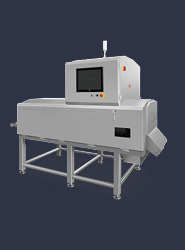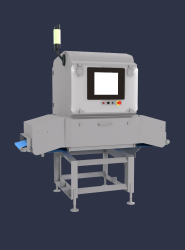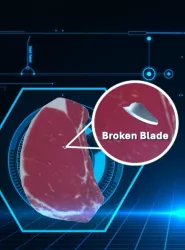RaymanTech Bulk X-ray Inspection:The First and Most Important Line of Defense in Food Safety
In food processing, the highest-risk moment isn’t at the final packing station—it’s the second a truck backs up to the silo and unloads tons of raw nuts, grains, seeds, spices, dried fruit, coffee, or frozen vegetables. At that point, everything is mixed together: the good product you paid for, plus stones from the field, metal from harvesting equipment, glass from a broken bulb in the dryer, twigs, leaves, shells, insect-damaged kernels, moldy berries, and pieces of plastic baling twine. One missed contaminant can travel through the entire plant, end up in finished goods, and trigger a recall that costs millions and destroys consumer trust.
This is exactly why leading processors no longer gamble on magnets, sieves, and optical sorters alone. They’ve moved the most powerful inspection technology to the very front of the line: the RaymanTech bulk-product X-ray inspection system.
Beyond the Limits of Traditional Sorting
Optical sorters are excellent at spotting surface color defects, but they can’t see inside a cashew or under the skin of a frozen pea. Metal detectors only react to conductive materials, so they completely miss glass, stone, dense plastic, ceramic, or wood. Destoners and sieves remove some heavy or oversized items, but they’re blind to anything close to the same size and density as the good product.
The RaymanTech bulk X-ray system eliminates these blind spots by combining three inspection technologies in one continuous flow:
1. Full-penetration X-ray imaging that sees density differences regardless of material type
2. High-resolution visible-light cameras for color and surface defect analysis
3. Deep-learning artificial intelligence that understands shape, texture, and context
The result is a machine that catches every major contaminant category in a single pass:
· High-density: metal, stones, glass, ceramic
· Low-density organics: plastic, rubber, paper, wood, twigs, insects, hair
· Product defects: shriveled or hollow kernels, mold, insect damage, broken pieces, discoloration
Precision Rejection That Protects Yield
Finding contaminants is only half the battle. Removing them without throwing away pounds of good product is the other half.
RaymanTech solves this with an array of ultra-fast air nozzles—up to 144 independently controlled jets. When the AI flags a defective item, only the precise nozzle aligned with that piece fires for a fraction of a second. The bad nut, bean, or raisin is flicked into a reject bin while everything around it continues untouched.
This level of precision is a game-changer for high-value commodities. An almond processor recovering an extra 1.5–2% of salable product can easily add six or seven figures to the bottom line every year. The same system that removes a bullet fragment from pistachios can simultaneously pull out shriveled kernels and off-color pieces.
Real-World Applications That Deliver Results
Coffee roasters use it to strip out sticks, husk fragments, and defective green or over-fermented beans before roasting begins—protecting expensive equipment and guaranteeing flavor consistency.
Spice and herb processors remove twigs, leaf stems, insect-eaten seeds, and yellowed cardamom in one pass, dramatically reducing complaints about “woody bits” in the final blend.
Nut handlers catch shell fragments, rancid kernels, and the occasional harvesting nail that no magnet could ever find.
Dried fruit and raisin lines reject moldy berries, stems, and sugar crystals while separating cap-stem attachments that ruin texture.
Rice and grain mills achieve export-grade purity (<0.01% impurity) that opens premium markets in Japan and Europe.
Freeze-dried vegetable plants eliminate plastic film and rubber pieces that optical sorters routinely miss.
Even cannabisely small-seed products like quinoa, sesame, or poppy seeds run cleanly at full production speed.
Built for the Toughest Environments
Bulk intake areas are dusty, wet, and hot. The RaymanTech system is engineered to thrive there:
· Full 304 stainless-steel construction with sloped surfaces that shed water
· IP67 protection throughout—high-pressure washdown ready
· Tool-free belt removal and open-frame design for fast daily cleaning
· Integrated industrial air conditioning to keep electronics cool and stable
· Radiation leakage below 1 µSv/hour—safer than the natural background in many parts of the world
Intelligence That Improves Every Day
The built-in AI isn’t static. It learns what “normal” looks like for your specific commodity, season after season. Then it recognizes subtle defect patterns better than the most experienced human grader. When harvest conditions change—smaller almonds one year, darker raisins the next—the system adapts automatically. Switching to an entirely different product for the next campaign takes only minutes of retraining.
Every image, every rejection reason, and every defect trend is logged and available instantly—on the machine touchscreen, through the plant network, or in the cloud. Managers can spot at a glance whether stone counts are rising (a signal to talk to growers) or whether insect damage spiked after rain.
The New Standard in Raw Material Purity
Processors who have installed RaymanTech bulk X-ray routinely describe it as the single biggest food-safety upgrade they’ve ever made. In an industry where “zero foreign material” is no longer a marketing slogan but a customer expectation, the RaymanTech bulk X-ray system has become the definitive gatekeeper—the technology that turns raw, unpredictable harvest material into ingredients you can trust, every silo, every truck, every day.
Ready to see how clean your incoming product can really be? Visit https://www.raymantech.us/x-ray-for-bulk-product/ or contact RaymanTech for a no-obligation trial on your own material. The first step to perfect finished goods starts with perfect raw materials.


Related Articles
-
 Nov-19-2025
Nov-19-2025RaymanTech Standard Dual Energy X-ray: Seeing the Invisible in Overlapped and Uneven Products
Picture a high-speed frozen broccoli line running at 60 meters per minute. Thousands of dark-green florets tumble straight from the IQF tunnel onto the belt. They overlap, fold, twist, and pile two or three deep. Some are still lightly coated with ice, others are perfectly dry. Hidden somewhere in that moving green avalanche is a sliver of blue plastic film, a tiny piece of rubber gasket, or a fragment of thinlearn more -
 Nov-19-2025
Nov-19-2025RaymanTech Dual Energy Residual Bone Detector: Absolute Bone Removal in Poultry Processing
Bone fragments are the poultry industry’s most persistent and expensive headache. Even the most advanced mechanical deboning systems leave behind collar bones, rib tips, fan bones, cartilage shards, and calcified tendon ends. These remnants are rarely metallic, often flexible, and almost impossible to see with the naked eye once the fillet is marinated, breaded, or frozen. Yet consumers notice them immediately—and one viral complaint can cost millions in lost contracts and brand damage.learn more -
 Nov-19-2025
Nov-19-2025Revolutionizing Needle Detection in the Meat Industry: Overcoming Hidden Risks with AI-Powered X-Ray Technology
As global demand for premium, safe meat products surges, processors are turning to advanced technologies to safeguard their supply chains. At RaymanTech, our AI-enhanced X-ray inspection systems are at the forefront of this transformation, offering unparalleled precision in detecting metal foreign objects like needle fragments. This article delves into the persistent pain points of needle detection in pork, beef, and lamb processing, the limitations of conventional tools, and how our innovative solutions deliver superior performance, drawing on the latest industry insights from RaymanTech's meat sector expertise.learn more

Quick Links
Contact
Tel: 717-490-1513
Add: 1050 Kreider Drive -
Suite 500, Middletown,
PA 17057







